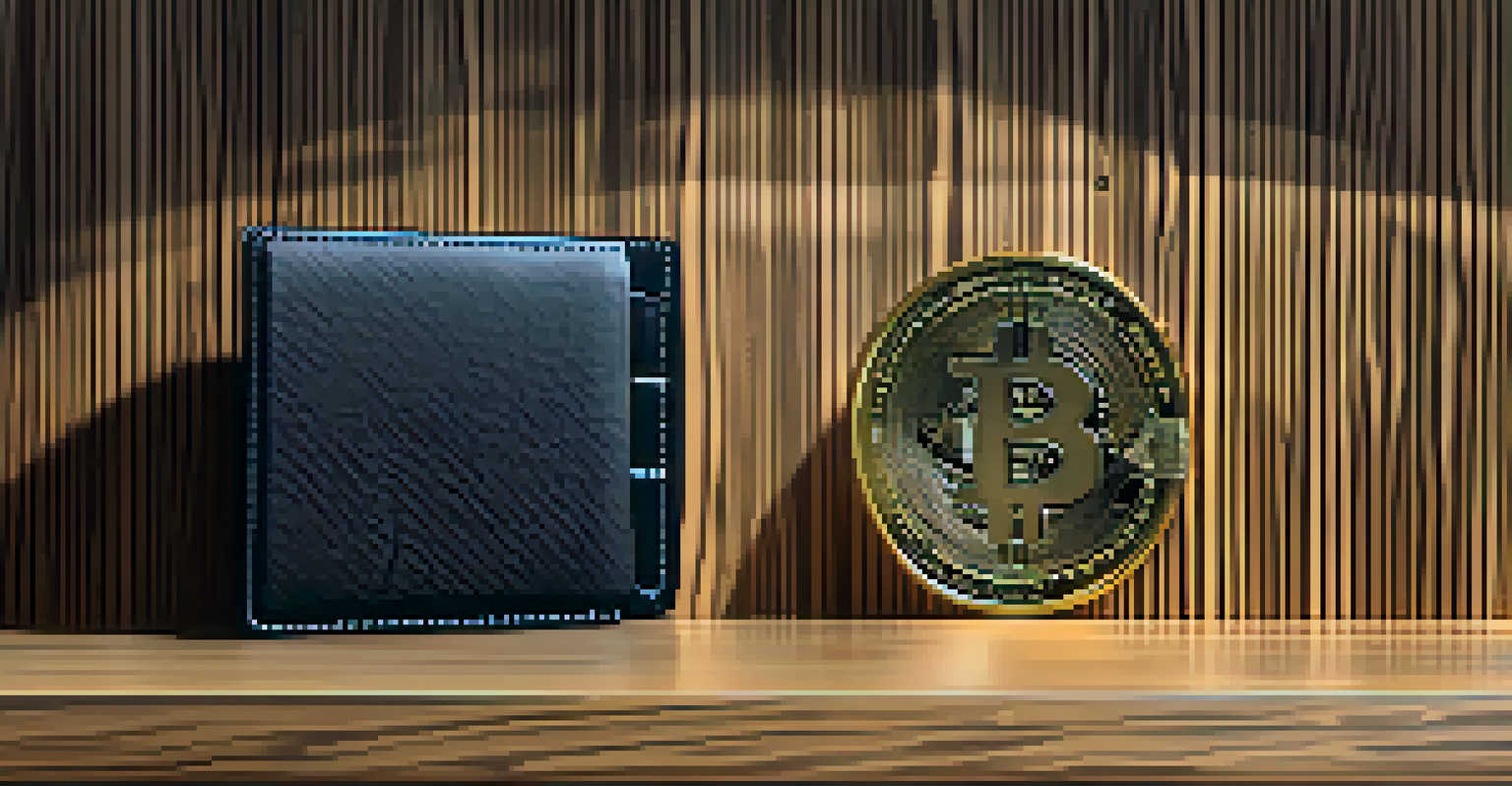Understanding Bitcoin Wallet Security Threats and Best Practices

What is a Bitcoin Wallet and Why is Security Crucial?
A Bitcoin wallet is a digital tool that allows you to store, send, and receive Bitcoin. Just like a physical wallet holds cash, a Bitcoin wallet keeps your cryptocurrency safe. However, the digital nature of these wallets makes them susceptible to various security threats, making robust security practices essential.
The way to gain a good reputation is to endeavor to be what you desire to appear.
With the growing popularity of Bitcoin, hackers and cybercriminals are increasingly targeting wallets to steal funds. Without a secure wallet, you risk losing your investments in an instant. This underscores the importance of understanding how to protect your wallet effectively.
In this article, we will explore common security threats and best practices to safeguard your Bitcoin wallet. Whether you're a seasoned investor or new to the crypto world, knowing how to protect your assets can save you from potential losses.
Common Security Threats to Bitcoin Wallets
Bitcoin wallets face several security threats, with phishing attacks being one of the most prevalent. In these scams, attackers create fake websites or emails to trick users into revealing their private keys or login credentials. This deceptive tactic can lead to significant financial loss if users aren't vigilant.

Another major threat comes from malware, which can infiltrate your device and compromise your wallet. Once installed, malware can steal sensitive information or even take control of your wallet. Regular software updates and antivirus protection help mitigate this risk, but they are not foolproof.
Secure Your Bitcoin Wallet
Implement strong passwords and two-factor authentication to protect your digital assets from cyber threats.
Lastly, there are risks associated with public Wi-Fi networks. Using your Bitcoin wallet on unsecured networks can expose you to snooping attacks where hackers intercept your data. Always be cautious and consider using a virtual private network (VPN) when accessing your wallet in public.
Importance of Strong Passwords and Two-Factor Authentication
One of the simplest yet most effective ways to enhance your Bitcoin wallet security is by using strong, unique passwords. A strong password should be long, complex, and not easily guessable. Consider using a password manager to keep track of different passwords for various accounts.
Security is not a product, but a process.
In addition to strong passwords, enabling two-factor authentication (2FA) adds an extra layer of protection. With 2FA, even if someone obtains your password, they would still need a second form of verification, like a code sent to your phone. This significantly reduces the risk of unauthorized access to your wallet.
Combining a strong password with 2FA creates a robust security barrier against potential attackers. Always remember that these basic steps can save you from a lot of headaches and financial loss in the future.
Choosing the Right Type of Bitcoin Wallet
There are various types of Bitcoin wallets available, each with its own security features. Hardware wallets, for example, store your private keys offline, making them less vulnerable to hacking. They are often considered one of the safest options for long-term storage of Bitcoin.
On the other hand, software wallets are more convenient for daily transactions but can be susceptible to online threats. It's crucial to find a balance between convenience and security based on your individual needs. Ultimately, understanding the pros and cons of each wallet type helps you make an informed decision.
Choose the Right Wallet Type
Select a Bitcoin wallet that balances security and convenience, such as hardware wallets for long-term storage.
No matter which wallet you choose, ensure that it has a strong reputation and positive user reviews. Researching wallet options can make a significant difference in safeguarding your Bitcoin assets.
Regularly Backing Up Your Wallet
Backing up your Bitcoin wallet is a crucial step in ensuring that you don’t lose access to your funds. If your device fails or gets lost, having a backup means you can restore your wallet on a new device. Make sure to conduct backups regularly and store them in a secure location.
When backing up, remember to save your wallet's recovery phrase or seed phrase, which is essential for restoring access. Store this information offline and never share it with anyone. A good practice is to write it down and keep it in a safe place, similar to how you'd store important documents.
By prioritizing regular backups, you can protect yourself against unforeseen issues that could jeopardize your Bitcoin holdings. This simple step is often overlooked but can be a lifesaver in times of need.
Keeping Software Updated for Enhanced Security
Keeping your wallet software up to date is critical for maintaining security. Wallet developers frequently release updates to patch vulnerabilities and improve functionality. Failing to update your software can leave you exposed to security threats that have already been addressed.
In addition to wallet software, ensure that your operating system and antivirus programs are also up to date. This holistic approach to maintaining your device's security landscape minimizes the risk of malware and other cyber threats. Just like you wouldn't drive a car with faulty brakes, you shouldn't use outdated software.
Regular Backups Are Essential
Backing up your wallet and keeping recovery phrases secure can prevent loss of access to your funds.
Set reminders to check for updates regularly, or enable automatic updates if available. This proactive approach helps you stay ahead of potential security issues and protects your Bitcoin assets.
Educating Yourself About Bitcoin Security
Knowledge is power, especially in the world of cryptocurrency. Educating yourself about Bitcoin security can help you recognize potential threats and understand how to mitigate them. There are numerous resources available online, from articles to tutorials, that can help you get a grasp on best practices.
Participating in community discussions and forums can also provide valuable insights into the latest security trends. Engaging with fellow Bitcoin enthusiasts allows you to learn from their experiences and share your own. This sense of community can be incredibly supportive and informative.

Ultimately, staying informed empowers you to make better decisions regarding your Bitcoin wallet security. The more you know, the safer your assets will be in this ever-evolving digital landscape.